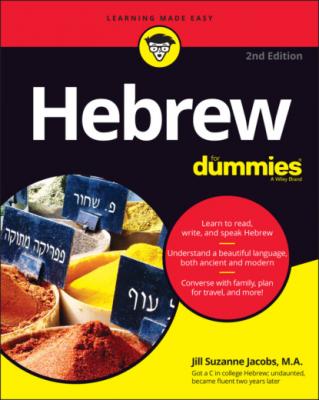Hebrew For Dummies. Jill Suzanne Jacobs
Читать онлайн.| Название | Hebrew For Dummies |
|---|---|
| Автор произведения | Jill Suzanne Jacobs |
| Жанр | Иностранные языки |
| Серия | |
| Издательство | Иностранные языки |
| Год выпуска | 0 |
| isbn | 9781119862048 |
www.dummies.com/go/hebrewfd2e.
Beyond the Book
In addition to what you’re reading right now, this book comes with a free, access-anywhere Cheat Sheet containing tips and techniques for learning Hebrew faster. To get this Cheat Sheet, simply go to https://www.dummies.com and type Hebrew For Dummies Cheat Sheet in the search box.
Where to Go from Here
First, the good news: You don’t have to read this entire book. In fact, you don’t have to read any of it. (But if that’s the case, you probably wouldn’t have bought it.) Anyway, here’s my point: This book is organized so that you can read only the chapters that interest you and skip the rest. At no point in the text do I assume that you’ve read any of my scintillating writing in other chapters or sections, and I won’t get insulted if you want to read only certain chapters.
If you’re interested in the religious stuff, by all means, go straight to chapters 17, 18, and 19. But if you’re interested in the day-to-day stuff, or if you just want to know how to ask that cute Israeli out on a date, Chapter 3 may be your cup of tea. Take a look at the table of contents and turn to the chapter that most interests you. Go ahead and do it! Read this book out of order. Skip chapters. I won’t tell anyone. In fact, I’ll never know.
All right, all right, I do have to add a few exceptions to the read-anything-you-want rule. You’ll probably want to read Chapter 1, which gives you an overview of the book. And if you’re a grammar geek, you’ll looooove Chapter 2. If you aren’t a grammar geek (most people despise the stuff, and I can’t say that I blame them), you may want to look at Chapter 2 anyway. Here’s a tip from someone who knows: After you understand the basics of Hebrew grammar, picking up the rest of the language is a cakewalk. So, consider checking out Chapter 2.
Part 1
Getting Started with Hebrew
IN THIS PART …
See the links between Hebrew and English.
Master the basics of Hebrew grammar.
Say “Hello” — and “Goodbye”.
Chapter 1
You Already Know Some Hebrew
IN THIS CHAPTER
!בָּרוּךְ הַבָּא (Bah-rooh Hah-Bah!; Welcome to Hebrew!) In studying Hebrew, you’re joining millions of other Hebrew speakers around the world. Its two centers are Israel (of course) and North America, which is home to many Hebrew newspapers, Hebrew-speaking camps and schools, and institutions. You’re also speaking the Bible’s original language and one of the most ancient languages still spoken today. Furthermore, you’re speaking the only language in the history of the world known to have undergone a revival, returning fully to being a spoken language after hundreds — perhaps even 2,000 — years of being relegated to correspondence, literature, and the sacred world of prayer and the Bible.
Hebrew was once almost exclusively a holy language — a language of prayers and ritual, of the Bible and other sacred texts, and a language above the humdrum of the everyday. That’s no longer true. The same ancient and holy tongue is now the language of sunbathing on the beach, eating dinner, going to the doctor, and carrying out the myriad events of everyday life.
All languages are portals — openings to culture and friendship, literature, and ideas. Discover any one of these portals, and a whole new world opens up to you. Discover Hebrew, and a whole Jewish and Israeli world is yours.
Taking Stock of What’s Familiar
If you’ve ever been to a synagogue or had a bit of Jewish education, you probably know a little Hebrew already. But even if you’ve never walked through a synagogue’s door or studied anything Jewish, you probably still know some Hebrew words. You’ve probably heard the word amen, for example. That word is Hebrew! Amen comes from a word meaning “faith” or “belief,” and people usually say it at the end of a prayer. And the word Hallelujah? Hebrew again! The word literally means “Praise God.” Even the word alphabet derives from the Hebrew words for the first two letters of its alphabet, aleph and bet. (To see what the Hebrew alphabet looks like, check out “Recognizing Tips to Help You Read Hebrew” later in this chapter.)
You may have heard other Jewish words, of course, such as שלעפּ (shlehp; to drag or pull) and קְוֶעְהְהָשׁ (kvehtsh; to complain), which are actually Yiddish (the language of the Jews of Eastern Europe combining Old High German, Hebrew, and other languages) and are part of the Israeli vernacular today. You may never have thought about other words that have Hebrew roots. Did you know that cinnamon is a derivative of the Hebrew word קִנָּמוֹן (kee-nah-mohn), which appears in the biblical book The Song of Songs? The English word dilute may derive from the Hebrew word דַּל (dahl), which means “weak” or “thin” and first appears in the biblical book of Genesis.
Some people claim that Hebrew is the mother of all languages. No matter what its history or origin, Hebrew, a language that has its origins in the Fertile Crescent, has crept into North American spoken English. This process works in reverse, too, as many English words and phrases have crept into the Hebrew language. Interestingly enough, although you as an English speaker
